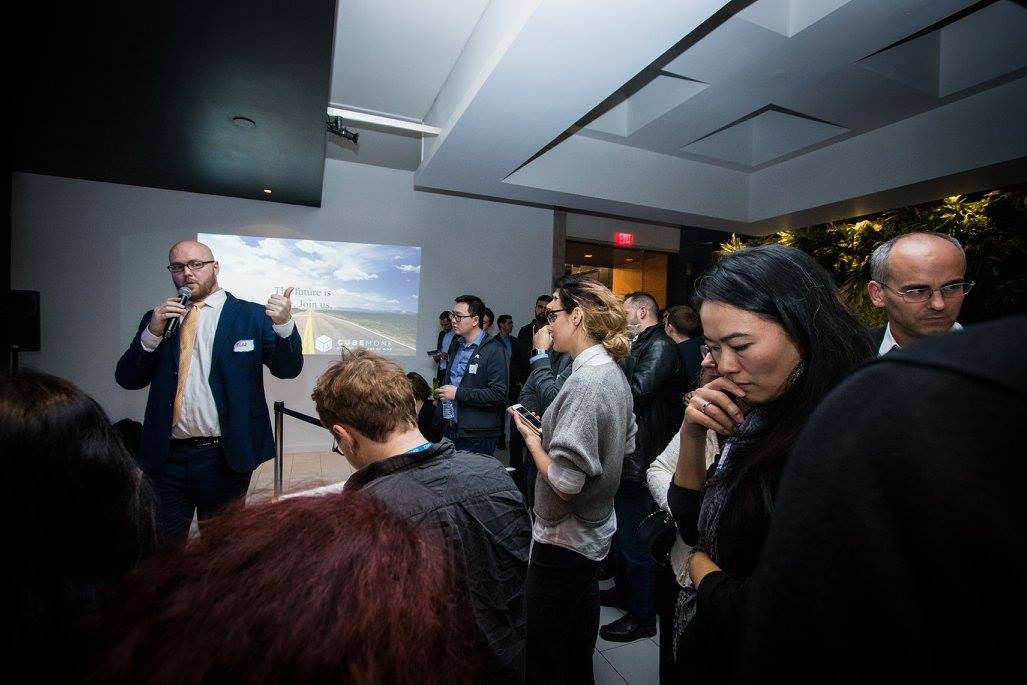Momentum is building for Kansas City-based CubeMonk — and the blockchain cryptography platform behind it is poised to go further than most people can even imagine, said Todd Haselhorst.
“You’re talking about a wave of innovation the likes of which we’ve never seen before,” said Haselhorst, CEO and co-founder of CubeMonk. “If the internet was the Third Industrial Revolution, blockchain cryptocurrency is the fourth. Those who understand it and are able to apply it to business models through economics and game theory will be creating the models of the future.”
CubeMonk’s technology combines blockchain with the Internet of Logistics to provide lower costs, as well as increased transparency, efficiency and profits for those in its shipping marketplace.
“We started working on this concept to turn freight and logistics equipment into a commodity and have a marketplace that allows for quoting optimization, book and tracking of shipments in real time,” Haselhorst said.
Incorporated in September, the company’s concept quickly caught international recognition, winning first place at the DisruptiveIO Blockchain Pitch Competition Nov. 30 in Toronto, Canada — one of the best scenes for FinTech in the world, Haselhorst said.
“When I went to Toronto, I knew we were on to something big. I didn’t quite know how big until we talked to the FinTech community of Toronto. They were very receptive,” he said. “It’s been a very interesting ride, but from that point forward, we’ve had non-stop calls.”
Redefining value, how businesses interact
With its headquarters at WeWork in Kansas City, CubeMonk boasts a team of nine full-time contributors, 15-20 advisors and numerous other collaborators, he said. The company is working out the details and strategy for a private token pre-sale launch in the first quarter of 2018.
“Our goal is to work with the major industry players,” Haselhorst said. “You have brokers and shippers on one side of the ecosystem. You have providers, carriers and vendors on the other side. So creating a consortium in and around using this technology to build a marketplace and an equipment exchange is, in a lot of ways, redefining the way business is done worldwide.”
Such waves of innovation are hitting at a quick pace, he said.
“It’s a dancing, extremely rapidly changing thing — more so than most people are even aware,” Haselhorst said. “Bitcoin was the first wave. It was a blockchain protocol and currency and payment network. The second wave was smart contracting, platforms like Ethereum and BitShares. And the third wave is what’s hitting right now: the combination of IoT blockchain and artificial intelligence, in conjunction with things like IOTA. They’ve got some technology that’s really game-changing.”
At stake is the very future of what is considered “money,” he said.
“The logical conclusion: We say data equals value, and we use that as an exchange of value instead of our current currency that we use,” Haselhorst said.
How well is Kansas City prepared?
Most businesses aren’t ready for what’s to come, Haselhorst said, but it’s in their best interests to adapt — or better yet, lead.
“Blockchain cryptocurrency is fascinating technology at its core. It’s something Kansas City needs to leverage,” he said. “It’s here to stay and the faster we adopt this technology, the better off Kansas City will be in the future.”
The power of blockchain lies in open source communities that have a monetary protocol that allows commerce to occur in worldwide, distributive, decentralized and community-owned projects, Haselhorst said. Such environments also help industries achieve optimization through self-policing, he added.
“A lot of the business problems that you see right now are the result of companies becoming bad actors because that activity is beneficial to them,” Haselhorst said. “Where we’re headed is toward giant, community-run projects that incentivize good behavior.”
Leveraging IoT blockchain and artificial intelligence technologies in an industry worth $8 trillion worldwide is a powerful concept, he said, but it requires precision. Select local IoT projects and the city’s Smart City initiative would likely be among those that would fit well into blockchain’s advancements, Haselhorst said.
“I know a lot of people are in the mentality of ‘blockchain everything.’ In all reality, I don’t think that’s necessary, but Kansas City has a very firm foundation. We have a lot of the groundwork laid,” he said. “If entrepreneurs can find a way to create models within that space to allow Kansas City to become a hub for cryptocurrency and FinTech, then it would provide a lot of benefit if leveraged appropriately.”
“It comes down to: Is the interest there? Is the knowledge there? I don’t know yet,” he added. “Businesses, governments and the world at large are not exactly prepared for this degree of change. But I would argue the same was true when the internet first came out.”







































